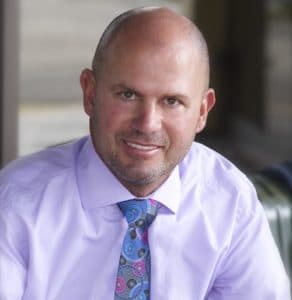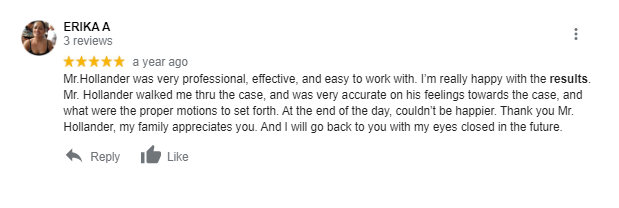
When a loved one moves into a nursing home, you place a tremendous amount of trust in the people who will care for them. You expect compassion, basic human decency, and safety. But too often, that trust is broken behind closed doors.
When you choose Hollander Law Firm Accident Injury Lawyers, we’ll give you the space to tell your full story unabridged. No interruptions, no assumptions. Just a real conversation about what happened and how it’s affected your loved one – and you.
We believe that honest, open communication is the foundation of any meaningful relationship between a Boca Raton nursing home abuse lawyer and the families who need help. You deserve to work with someone who will take the time to understand what you’ve been through before offering solutions.
Table of Contents
We’ll Treat You With the Respect and Compassion You Deserve
At Hollander Law Firm Accident Injury Lawyers, we don’t treat you like another legal matter to get through. We treat you like a person who deserves to be heard and respected. That starts with how we approach the attorney-client relationship.
From the first meeting, we’ll make time for questions. We won’t rush your answers, and you’ll have space to reflect and revisit anything you forgot to mention. Your Boca Raton nursing home abuse attorney with our firm will make it a priority to build trust – not just for the sake of the case but because your peace of mind matters.
You’ll never have to wonder where your case stands or whether your concerns are being taken seriously. We believe that meaningful progress comes from meaningful connection. That’s why we’ll check in regularly, talk through developments in plain language, and always leave room for you to weigh in. Of course, you can always count on us to keep all conversations confidential.
When Care Disguises Harm
You may not have suspected anything at first. Maybe your loved one seemed withdrawn or more anxious than usual. Maybe they stopped eating. Or maybe it was something as simple as medication going missing or hygiene slipping in ways that didn’t make sense. These signs don’t shout – they whisper. But when you’re tuned in, you hear them loud and clear.
A nursing home setting can blur the line between professional care and personal harm. Staff might say a resident fell due to “age-related weakness” when, in reality, basic care was withheld. Administrators may deflect complaints, blaming memory loss or confusion. We won’t make excuses for inexcusable conduct when you speak to us. A Hollander Law Firm Accident Injury Lawyers Boca Raton nursing home abuse attorney with our firm will take your concerns seriously and investigate them with care, not judgment.
We’ll look at the circumstances around your loved one’s care with a detailed, methodical eye. Were they fed regularly? Were their medications administered correctly? Were requests for assistance ignored? No matter how subtle the mistreatment may seem, we’ll examine it thoroughly. We’ll focus on uncovering the truth – not just what was done but what should have been done differently.
Trust Is Personal – So Your Case Should Be, Too
Every family walks through our doors with a unique story. Some come after months of confusion, and others after a single shocking event. What they all share is the sense that something isn’t right and the need for someone to care enough to find out why.
Your Boca Raton nursing home abuse lawyer will take the time to understand not only what happened but who your loved one is. Their personality. Their preferences. The way they lived before entering the facility. These details matter because they show how abuse or neglect changed their day-to-day reality – and yours.
We don’t believe in rushing families through a process they didn’t ask to be part of. When you work with us, your voice won’t get lost in legal jargon. You’ll speak with someone who’s truly listening. We’ll build your case around the people affected – not abstract legal theories. That approach gives you more than legal representation. It gives you a path forward that respects your family’s humanity.
Patterns Hidden in Plain Sight
Nursing home abuse often follows predictable patterns – ones that facilities don’t want you to see. Understaffing is a common thread, leading to skipped meals, missed medication, or residents left waiting for help that never comes. Sometimes, it’s management cutting corners, hiring underqualified workers to save a few dollars. Other times, a culture of silence discourages staff from speaking up about colleagues who mistreat residents.
You won’t have to piece this puzzle together alone. A Boca Raton nursing home abuse attorney will examine hiring records, training policies, and employee schedules. We’ll review medical charts and care logs. We’ll ask questions the facility might prefer to ignore. Did anyone log the resident’s vitals on the day they fell ill? Were those records changed after the fact? Did staff members file internal complaints that were buried instead of addressed?
We’ll also talk to former employees and other residents if appropriate. Often, what’s seen as a one-off mistake is part of a larger pattern of disregard. The key lies in uncovering what the home tried to cover up. That’s where we come in – with persistence, not theatrics.
Defining Harm in Real, Measurable Terms
Abuse isn’t always physical. Sometimes, the damage shows up in ways that are harder to quantify – depression, anxiety, emotional withdrawal. These outcomes are just as real and just as painful as a broken bone or untreated infection. A Boca Raton nursing home abuse lawyer will take the full impact into account, not just what appears on the surface.
We’ll work with medical professionals to understand what went wrong and what your loved one needs to heal. We’ll look beyond current expenses to consider long-term care, therapy, or even relocation if staying in the same facility no longer feels safe. If your loved one lost weight dramatically, developed pressure injuries, or withdrew from family visits, those details won’t be glossed over.
Your case will reflect the full story of what your loved one endured. Not just because it makes for a stronger legal argument but because it’s the truth. Our role is to give voice to what happened in a way that compels attention – and action.
Abuse Doesn’t Always Come From Strangers
One of the most difficult realities for families is that abuse can come from those they trust most. It can be a longtime nurse who seemed kind at first. Or a caregiver who formed a bond with your loved one but then began to take liberties, ignoring requests or denying dignity. This betrayal adds another layer of pain.
You don’t have to handle that betrayal alone. A Boca Raton nursing home abuse attorney from our firm will help you unpack what happened – not just factually but emotionally. That’s part of why we invest so much in understanding your perspective. When care becomes control and compassion turns into coercion, we’ll be ready to challenge that abuse with facts and heart.
Your relationship with your loved one didn’t disappear when they moved into a nursing home. If anything, it became more important. We’ll honor that bond by giving you space to speak and helping you take steps that reflect the seriousness of what occurred.
Shining Light on a Culture of Denial
Facilities often try to handle abuse in-house. They’ll claim to have conducted their own review. They’ll insist that “the matter has been addressed” or that “corrective action has been taken.” In some cases, they’ll even suggest that you misunderstood what happened.
You deserve more than dismissal. You deserve clarity. That’s where a Boca Raton nursing home abuse lawyer will step in and disrupt the cycle of denial. We won’t settle for vague reassurances. We’ll press for real answers. Did the home file an incident report? Was the state notified, as required under Florida law? If not, why?
We’ll also look at prior regulatory actions. Has the facility been cited before by the Florida Agency for Health Care Administration? Was it ever placed on a watchlist? These are public records, and they can tell a powerful story when combined with your personal experience. Abuse doesn’t happen in a vacuum – it grows in places where accountability is scarce. We’ll work to change that.
No Excuse for Indifference
Too often, nursing homes try to justify neglect by pointing to limited resources or the demands of elder care. But a lack of staffing doesn’t excuse cruelty. High turnover doesn’t excuse negligence. These are business decisions made by management – choices that prioritize profits over people.
You deserve better. So does your loved one. When you hire a Boca Raton nursing home abuse attorney, you’re not just responding to a single act. You’re drawing a line. You’re saying that your family matters, and corporate cost-cutting won’t be tolerated when it leads to human harm.
We’ll take a close look at those corporate structures. Who owns the facility? Who sets the budget? Who decides how many aides work each shift? These questions matter. Because sometimes, the person responsible isn’t the one administering care. It’s the one withholding the tools and time needed to do it right.
Telling the Whole Story, Not Just the Easy One
Some nursing home abuse cases unfold like puzzles with missing pieces. You might sense that something’s off but have no clear explanation. Your loved one may hesitate to talk or say nothing at all. That silence doesn’t erase the harm. It only makes your concerns more important. Abuse doesn’t always announce itself – it often lurks in the quiet, the subtle changes, the sudden shift in behavior or routine.
A Boca Raton nursing home abuse lawyer will know how to spot those changes for what they are: signs that deserve attention, not dismissal. We’ll listen when others don’t. We’ll take seriously the observations that others might brush off. Even if the story isn’t linear or easy to tell, we’ll take the time to understand what’s beneath it.
Listening to Silence and Looking Beyond
It’s common for elderly residents to minimize what they’ve been through. Some are scared. Others have been conditioned not to question authority. That doesn’t mean their suffering should go unaddressed. A Boca Raton nursing home abuse attorney with our firm will approach their story with care. We won’t rush the conversation, and we won’t pressure anyone to relive trauma before they’re ready. But we also won’t wait for perfect clarity before taking action.
We’ll look at patterns that don’t always appear suspicious at first glance. Why did your loved one lose so much weight in a short time? Why did they suddenly stop participating in activities? These aren’t random changes. They’re data points. Your attorney will use them to build a case that reflects what happened – not just what the facility is willing to admit.
Facing Hard Truths with Care and Purpose
Sometimes, the truth isn’t easy to hear. But that’s never a reason to turn away. A Boca Raton nursing home abuse lawyer will face uncomfortable facts head-on because your family’s experience matters. We’ll consult medical professionals, request full documentation, and press for answers that the facility may have tried to keep hidden. You’ll have someone in your corner who won’t settle for half-truths. We’ll make sure the whole story gets told.
A Legal Strategy That Reflects Your Values
Legal action isn’t just about compensation. It’s about recognition. It’s about making clear that your loved one’s experience deserves attention and that the harm they suffered isn’t just part of aging – it’s unacceptable, period.
Your Boca Raton nursing home abuse lawyer will craft a legal strategy that reflects your values. If your priority is holding the facility publicly accountable, we’ll talk about options that bring that behavior to light. If your focus is getting your loved one relocated safely and discreetly, we’ll approach the case accordingly. Your voice will guide the approach, not the other way around.
Because Families Deserve Better
You trusted someone to care for your loved one. When that trust was broken, you stepped up. Now, it’s time for someone to step up with you. A Boca Raton nursing home abuse attorney from Hollander Law Firm Accident Injury Lawyers will meet you where you are, listen to what matters, and fight for an outcome that does justice to your family’s story.
You’re not alone. We’re ready when you are. Use our online form or call (561) 677-2795 for a free case evaluation.
Boca Raton Nursing Home Abuse Review

https://goo.gl/maps/cN4hU53hKm2NCpG4A
Boca Raton Physical Therapists
- Boca Raton Physical Therapy Center – 7200 W Camino Real #100, Boca Raton, FL 33433
- Actify Physiotherapy & Wellness – 7000 W Palmetto Park Rd Suite 305, Boca Raton, FL 33433
- Pelvicore Rehab LLC – 7284 W Palmetto Park Rd Suite 105, Boca Raton, FL 33433
- JNP Physical Therapy – 7960 La Mirada Dr, Boca Raton, FL 33433
*Disclaimer – we do not endorse these companies or profit from having them listed on our website.
Our personal injury law firm in Boca Raton, FL also provides:
- Assault Accident Attorney in Boca Raton, FL
- Bicycle Accident Lawyer in Boca Raton, FL
- Boating Accident Attorneys in Boca Raton, FL
- Brain Injury Lawyers in Boca Raton, FL
- Burn Injury Attorneys in Boca Raton, FL
- Bus Accident Lawyers in Boca Raton, FL
- Car Accident Attorneys in Boca Raton, FL
- Catastrophic Injuries Lawyers in Boca Raton, FL
- Child Injury Attorneys in Boca Raton, FL
- Child Molestation Injury Lawyer in Boca Raton, FL
- Construction Accident Lawyer in Boca Raton, FL
- Cruise Ship Accident Attorneys in Boca Raton, FL
- Day Care Injury Lawyers in Boca Raton, FL
- Day Care Negligence Attorney in Boca Raton, FL
- Defective Toy Attorney in Boca Raton, FL
- Dog Bites Attorney in Boca Raton, FL
- Hip Replacement Injury Lawyer in Boca Raton, FL
- Lyft Accident Attorney in Boca Raton, FL
- Medical Malpractice Attorneys in Boca Raton, FL
- Motorcycle Accident Lawyers in Boca Raton, FL
- Parasailing Accident Attorney in Boca Raton, FL
- Pedestrian Accident Lawyer in Boca Raton, FL
- Premises liability Attorney in Boca Raton, FL
- Product Liability Lawyers in Boca Raton, FL
- Recreational Vehicle Accident Attorneys in Boca Raton, FL
- Scaffolding Accident Lawyer in Boca Raton, FL
- Scooter Accident Attorney in Boca Raton, FL
- Slip and Fall Attorneys in Boca Raton, FL
- Spinal Cord Lawyer in Boca Raton, FL
- Taxi Accident Attorney in Boca Raton, FL
- Train Accident Lawyers in Boca Raton, FL
- Truck Accident Lawyers in Boca Raton, FL
- Uber Accident Lawyer in Boca Raton, FL
- Watercraft Accident Attorney in Boca Raton, FL
- Workers’ Compensation Lawyer in Boca Raton, FL
- Workplace Accident Attorneys in Boca Raton, FL
- Wrongful Death Lawyers in Boca Raton, FL
